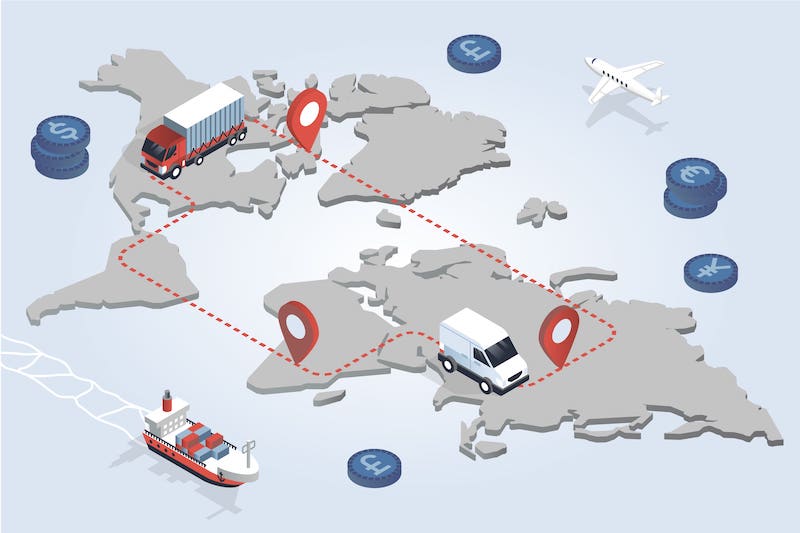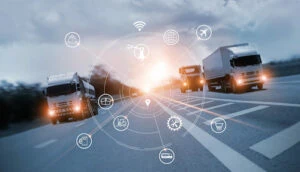Protect yourself and your company's belongings! Today there are many different technical devices on the market that can help us do this. But which one is right for you and meets your requirements? An Apple AirTag or a GPS tracker? In this article we will compare Apple AirTags and GPS trackers and show you what advantages and disadvantages the two devices have.
What are the main features of the two devices?
The Apple AirTag is a small, lightweight tracking device that can be used to track items. It is controlled via an app on the iPhone and is connected to Apple technology. With the AirTag, you can see where your items are on a map. You can also be notified when the device is out of the area you set.
A GPS tracker is a device that allows tracking objects or people and determining their position using satellite data. There are different types of GPS trackers that can be used for different purposes. Some can be used to track and monitor vehicles or cargo carriers, while others are suitable for tracking people or objects.
How do Apple AirTags work?
Apple AirTags are round trackers that connect to your iPhone or iPad and allow you to find your device even when it is within Bluetooth range (about 10 meters) of a compatible Apple device. The tags work with new software called "Apple Tag" that is downloaded to your device. The software collects data about your device's movements and syncs that data with the tracking device. This allows you to see where your object has moved recently. Whenever an iPhone is near an AirTag, the location of the AirTagged object is updated.
How do GPS trackers work?
GPS trackers are devices that use GPS signals or Wi-Fi to determine the precise position of an object indoors or outdoors. Most GPS trackers have a built-in GPS module that determines the device's position in real time and sends it to a central server. This server can then be accessed by a user to display the device's position.
Application areas of Apple AirTags
Apple AirTags provide a great way to occasionally monitor and track valuable items. The app shows you the exact location of the AirTag on a map. Apple's "Find My" app can be used to quickly locate the owner in the event of loss. This is especially handy for people who carry a lot of easily lost items, such as backpacks, car keys or key fobs. AirTags also allow you to keep track of your items at all times by retrieving their location on your Apple device.
Areas of application of GPS trackers
GPS trackers are devices that can be used to track the position of an object. They are often used to locate vehicles or stored goods. But other assets such as containers can also be located with the help of GPS trackers. It is often very difficult for companies and individuals to track objects, especially when they are in motion. By using trackers, such valuable items can be easily tracked. A tracker can monitor a vehicle's driving behavior or location, making it easy to detect potential theft. GPS trackers also allow the owner to track the location of the vehicle anytime, anywhere.

What do Apple AirTags and GPS trackers have in common?
The two devices have many things in common. Both are handy and easy to use and work in a similar way. Both devices send their position data via Bluetooth or Wi-Fi to a receiver, which uses this data to determine your position.
What are the differences between Apple AirTags and GPS trackers?
The main differences between Apple AirTags and GPS trackers are in the technology and how they work. GPS trackers can be tracked over longer distances and offer more accurate positioning than AirTags. They can also be equipped with additional features such as alarms and geofencing.
Apple AirTags offer many application possibilities and a user-friendly interface. The advantage of the GPS tracker is its versatility, as there are many different types of trackers on the market.
The advantages and disadvantages of an Apple AirTag
Advantages
- Small and handy. Fits comfortably in your pocket or on your keychain, so it's always at hand.
- Very easy to use. Once connected to the iPhone or iPad, it can be used.
- The battery of the tracker lasts for a very long time. So you don't have to charge it all the time and can use it without hesitation.
- Waterproof.
Disadvantages:
- The tracker only works with iOS. If no Apple device is used, the AirTag cannot be used.
- Limited to Bluetooth signals and nearby Apple device network, which may render the tracker ineffective in less populated rural areas.
- No continuous tracking in real time.
- No automatic tracking and response when the object moves. Therefore, the owner does not receive notification when the object is stolen.
- Ineffective at tracking exact routes due to lack of GPS antenna.
The advantages and disadvantages of a GPS tracker compared to the Apple AirTag
Advantages
- Different models available for different applications.
- Tracking possible anywhere, regardless of the location of the tracked object.
- Real-time tracking possible.
- Condition monitoring by sensor technology possible.
- Reacts with warning messages or alarm when the object is moved or stolen.
- More robust than an Apple AirTag, depending on the design.
- Uses technology that reduces unnecessary battery consumption and provides battery life of several years.
Disadvantages
- Ongoing costs due to SIM connectivity and IoT platform
- More expensive to purchase

How do you decide what kind of locator you need? What factors do you need to consider?
Here are some factors to consider when deciding what type of tracking device you need:
- Purpose: For what purpose do you need a tracking device? Do you want to track your containers (KLT / SLT), vehicles or machines? Depending on what you want to use the tracking device for, you need to choose a device with the appropriate functions.
- Price: tracking devices can vary greatly in price. Therefore, it is important to set a budget before you choose a device.
- Features: Some tracking devices offer more features than others, such as real-time tracking, alarms, and geofencing. Consider which features are important to you before choosing a device.
- Size and weight: Some locators are larger and heavier than others. Depending on where the locator is to be placed on the asset, a lightweight or compact device must be chosen.
- Battery life: The battery life of locators can vary greatly. Consider how often you plan to use the locator and how long the battery life should be.
- Compatibility: Some locators are compatible only with certain devices or systems. Verify that the tracking device you are considering is compatible with your devices and your company's own systems.
Once you have taken these factors into consideration, you can start comparing tracking devices and find the one that is best for you.
Conclusion
Deciding which device is right for you depends on your individual needs and requirements. If you are looking for a tracking device that can easily retrieve lost items such as purses, keys or backpacks with relative ease, the AirTag is a good choice. Note, however, that unlike other trackers, it can only transmit location when an Apple device is nearby. However, if you are looking for a device to track objects that move a lot, are far away, or need to be located frequently, such as vehicles or shipping containers, a GPS tracker with real-time tracking, monitoring capabilities, and a long battery life is a more suitable choice.
Still not sure which device is right for your application? Contact us today and let us help you find the right solution with the right device for your needs.




